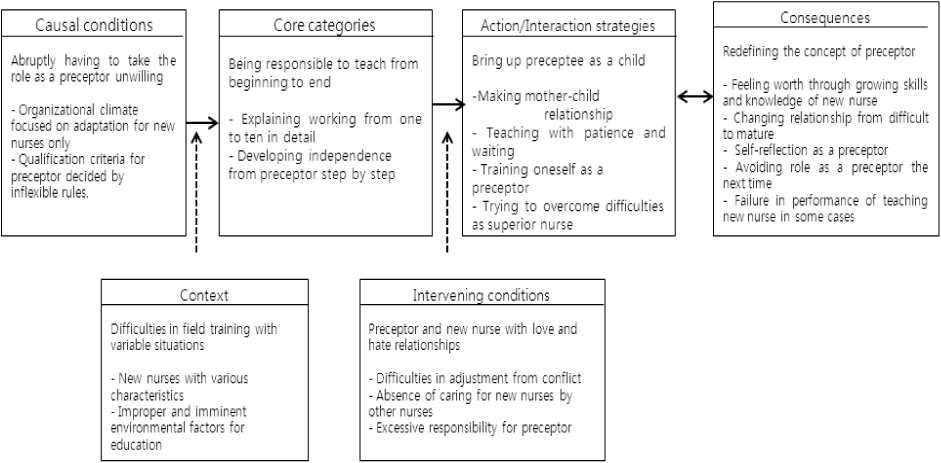J Korean Acad Nurs Adm.
2012 Mar;18(1):33-45.
The Role Experience of Preceptor Nurses in Hospitals
- Affiliations
-
- 1College of Nursing, Euji University, Korea.
- 2Department of Nursing, Dankook University, Korea. jongkimk@dankook.ac.kr
- 3Department of Nursing, College of Life Science and Natural Resources, Sunchon National Universtiy, Korea.
Abstract
- PURPOSE
The purpose of this study was to identify the role experience of preceptor nurses in general hospitals.
METHODS
Data were collected from 10 experienced preceptor nurses through in-depth interviews about their experiences. The main question was "How do you describe your experience as a preceptor in the process of role adaptation?" Qualitative data from field and transcribed notes were analyzed using Strauss & Corbin's grounded theory methodology.
RESULTS
The core category of experience in the process of role adaptation as a preceptor nurse was identified as 'being responsible to teach from beginning to end'. The participants identified five interactional strategies; 'abruptly having to take the role as a preceptor unwilling', 'difficulties in field training with variable situations', 'preceptor and new nurse with love and hate relationships', 'bring up preceptee as a child', 'redefining the concept of preceptor'.
CONCLUSION
The results of this study provide useful information for understanding the role of preceptor nurses in general hospital who have to teach new nurses with patience and responsibility. It will be needed to establishment of preceptor's role and educational standards, and policy for their rewards by nurse manager. Additionally, making cooperative educational climate in nursing ward is important for teaching new nurse.
Keyword
Figure
Reference
-
1. Benner P. From Novice to Expert : Excellence and Power in Clinical Nursing Practice. 2000. Upper Saddle River, NJ: Prentice Hall.
Article2. Dibert C, Goldenberg D. Preceptors' perceptions of benefits, rewards, supports and commitment to the preceptor role. J Adv Nurs. 1995. 21(6):1144–1151.3. Guba EG, Lincoln YS. Effective evaluation: Improving the usefulness of evaluation results through responsive and naturalistic approaches. 1981. San Francisco, CA: Jossey-Bass Publishers.4. Hautala KT, Saylor CR, O'Leary-Kelley C. Nurses' Perceptions of Stress and Support in the Preceptor Role. J Nurses Staff Dev. 2007. 23(2):64–70.
Article5. Hickey MT. Baccalaureate nursing graduates' perceptions of their clinical instructional experiences and preparation for practice. J Prof Nurs. 2010. 26(1):35–41.
Article6. Huh HK, Choi SS, Ahn YH, Lim YM, Shin YH, Park SM, Kim KY, Song HY, Kim KK. Content Analysis of the Experience of Preceptors in Clinical Education for Senior Student Nurses. J Korean Acad Nurs. 2004. 34(5):859–868.
Article7. Kemper N. Win-win strategies help relieve preceptor burden. Nurs Manage. 2007. 38(2):10–12.
Article8. Kim JY. The effects of teaching style of preceptor and learning of new graduate nurse on nursing performance and satisfaction with preceptorship. 2003. Seoul: Seoul National University;Unpublished master's thesis.
Article9. Langan JC. Faculty practice and roles of staff nurses and clinical faculty in nursing student learning. J Prof Nurs. 2003. 19(2):76–84.
Article10. McVicar A. Workplace stress in nursing: a literature review. J Adv Nurs. 2003. 44(6):633–642.11. Moon KS, Park KS. The effects of preceptor preparation on the preceptor's role recognition and job satisfaction. J Korean Acad Nurs Adm. 2004. 10(4):401–415.12. Murphy BE. Positive precepting: preparation can reduce the stress. Medsurg Nurs. 2008. 17(3):183–188.
Article13. Myrick F. Preceptorship- is it the answer to the problems in clinical teaching? J Nurs Educ. 1988. 27(3):136–138.
Article14. Noh WJ, Song MS, Kim KN, Eum OB, Han YH, Park SH, Hong JH. Korean Hospital Nurses Association. The business report year of 2009: The annual survey on nursing manpower of the hospital in Korea. 2010. 02. Seoul: Author.15. Omasky GL. Staff nurses' experiences as preceptors and mentors: an integrative review. J Nurs Manag. 2010. 18(6):697–703.16. Park KO, Lee YY. Career Ladder System Perceived by Nurses. J Korean Acad Nurs Adm. 2010. 16(3):314–325.
Article17. Park JW, Kim KS, Bang KS. Preceptor's Perception of Student Preceptorship and Comparison of Perception of the Students' Clinical Competence Readiness between Nurses and Students. J Korean Acad Soc Nurs Educ. 2010. 16(2):213–221.
Article18. Park SY, Kim JS, Kim MH. A study of the burden of preceptor. J Korean Acad Fundam Nurs. 2003. 10(1):37–46.
Article19. Sandelowski M. The problem of rigor in qualitative research. ANS Adv Nurs Sci. 1986. 8(3):27–37.
Article20. Sim HS. A Study of Preceptee's Role Socialization And Preceptor Role Self-Perceptions. 2002. Daejeon: Chungnam National University;Unpublished doctoral dissertation.21. Smedley AM. Becoming and being a preceptor: a phenomenological study. J Contin Educ Nurs. 2008. 39(4):185–191.22. Strachota E, Normandin P, O'Brien N, Clary M, Krukow B. Reasons registered nurses leave or change employment status. J Nurs Adm. 2003. 33(2):111–117.23. Strauss A, Corbin J. Basic of qualitative research: Techniques and procedures for developing grounded theory. 1998. Thousand Oaks, CA: Sage Publications, Inc.24. Sung MS. A Study on the Educational Method of the preceptor for the new nurses by the focus group interview. 2011. Seoul: University of Korea;Unpublished Master degree.25. Yang NY, Han SS. Cognition of the Preceptors on the Preceptor's Role Stress and Competency Pre-Post Preceptorship Experience. J Korean Acad Soc Nurs Educ. 2004. 10(2):262–270.
- Full Text Links
- Actions
-
Cited
- CITED
-
- Close
- Share
- Similar articles
-
- The Effects of Preceptor Nurses' Self-leadership on Role Recognition and Job Satisfaction
- The Effect of Preceptor Nurses' Conflict Management Type on Preceptor Role Recognition and Core Competency
- Level of Beliefs, Knowledge and Performance for Evidence-Based Practice among Nurses Experienced in Preceptor Role
- Effects of Trait Anger and Anger Expression on Job Satisfaction and Burnout in Preceptor Nurses and Newly Graduated Nurses: A Dyadic Analysis
- The Role-expectations of Gerontological Nurse Practitioners and Performance of Gerontological Nursing by Nurses in Long Term Care Hospitals and General Hospitals


